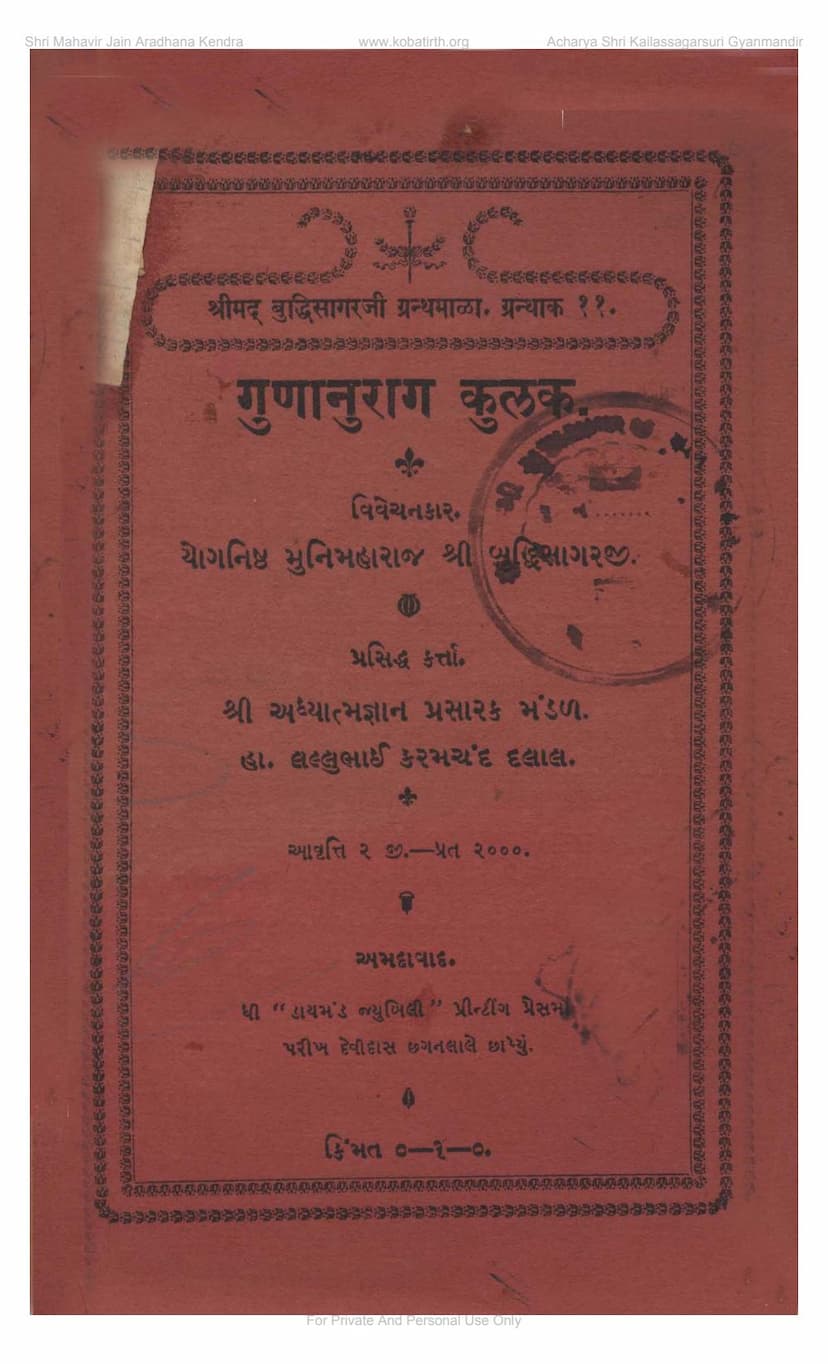Gunanurag Kulak
Added to library: September 1, 2025

Summary
This Jain text, titled Gunanurag Kulak (गुणानुराग कुलक), authored by Buddhisagar (बुद्धिसാഗર) and published by Adhyatma Gyan Prasarak Mandal (શ્રી અધ્યાત્મજ્ઞાન પ્રસારક મંડળ), is a profound exploration of the virtue of "Gunanurag" (गुणानुराग), which translates to "Love or Affection for Virtues" or "Appreciation of Good Qualities."
The book, particularly the sections translated from Gujarati, emphasizes the paramount importance of developing and cultivating "Saguṇ Dṛṣṭi" (सगुण दृष्टि), the "sight that perceives virtues."
Here's a comprehensive summary of the key themes and messages within the provided pages:
Core Message: The Power and Necessity of Appreciating Virtues (Gunanurag)
The central thesis of the book is that developing a deep affection and admiration for the virtues in oneself and others is a crucial path to spiritual progress and attaining ultimate happiness. It argues that focusing on the good qualities in others, even amidst their flaws, leads to personal spiritual upliftment and liberation.
Key Themes and Concepts:
- Perceiving Virtues (Gunanurag Dṛṣṭi): The book repeatedly stresses the need to cultivate the ability to see and appreciate the good qualities in all beings. This is presented as a fundamental aspect of spiritual wisdom.
- Overcoming Flaw-Finding (Dōṣa Dṛṣṭi): Conversely, the text strongly discourages the tendency to focus on and criticize the faults of others. This "flaw-finding" mentality is depicted as detrimental to spiritual growth and a cause of negativity.
- The Example of Tirthankaras: The text uses the Tirthankaras, especially Lord Mahavir, as prime examples of individuals who possessed profound Gunanurag. It highlights how they, despite their omniscience, chose to focus on and acknowledge the virtues of others, thereby inspiring spiritual progress.
- Distinguishing Between Virtues and Flaws: The book advises a discerning approach, advocating for the acceptance of virtues and the rejection or minimization of flaws. It suggests that focusing on a single virtue in a person is more beneficial than dwelling on multiple flaws.
- The Nature of Attachment (Rāga): The text differentiates between virtuous attachment (Prashasya Rāga) and unvirtuous attachment (Aprashasya Rāga). Unvirtuous attachment is to transient, worldly pleasures, which leads to suffering. Virtuous attachment is to the qualities themselves, which leads to spiritual growth.
- The Impact of Gunanurag on Spiritual Attainment: The book asserts that cultivating Gunanurag is the cause of attaining high spiritual states, including the Tirthankarhood. It is presented as a means to achieve various types of spiritual powers and prosperity.
- The Destructive Nature of Envy (Īrṣā/Mātsarya): The text strongly condemns envy, describing it as a blinding force that prevents one from appreciating others' virtues and ultimately leads to downfall and suffering. It uses examples to illustrate how envy leads to misery and spiritual stagnation.
- The Importance of Focusing on One's Own Virtues: While appreciating others' virtues, the book also implicitly encourages introspection and the cultivation of one's own good qualities.
- The Futility of Mere Rituals Without Gunanurag: The text criticizes the notion that mere performance of rituals, penance, or even scholarship is sufficient for spiritual progress if Gunanurag is absent. These actions become fruitless without the underlying attitude of appreciating virtues.
- The Role of Education and Asceticism: It is stated that even extensive learning or severe austerities are ineffective if Gunanurag is not present. True spiritual progress comes from cultivating this positive attitude towards virtues.
- The Danger of Criticism and Gossip: The book strongly advises against criticizing or gossiping about others' faults, even if they are evident. Such actions are depicted as leading to sin, karmic bondage, and the obstruction of spiritual growth.
- The Power of Positive Influence: The text suggests that by embodying virtues and appreciating them in others, one can positively influence them without direct criticism. The example of a mirror is used to illustrate how one can show others their own faults indirectly.
- The Importance of Equanimity (Samata): The state of Samata (equanimity), which is attained after Gunanurag, is presented as a higher spiritual stage. Gunanurag helps in controlling passions (Kashayas) like anger, pride, deceit, and greed.
- Respect for All Levels of Spiritual Progress: The book categorizes people into four levels of spiritual attainment (Sattama-uttam, Uttama-uttam, Uttama, and Madhyama) and emphasizes showing respect to all, especially those who exhibit even minimal spiritual qualities, particularly in the current age (Pancham Kal). It advises against criticizing even those who are spiritually weak.
- The Practice of Virtues for Future Lives: The text highlights that the virtues cultivated and practiced in this life will manifest in future lives, underscoring the long-term benefits of Gunanurag.
- The Condemnation of Sectarianism and Internal Criticism: A significant portion of the text addresses the issue of criticizing fellow monks or members of different Jain sects. It strongly advocates for mutual respect and appreciation of virtues across all groups, warning against the detrimental effects of sectarianism and internal criticism within the Jain community.
- The Goal of Liberation: Ultimately, the book presents Gunanurag as a direct path to achieving liberation (Moksha) and attaining the state of Parmatma (Supreme Soul).
In essence, "Gunanurag Kulak" serves as a guide for cultivating a positive and virtuous mindset, emphasizing that true spiritual advancement lies not in finding fault with others, but in actively appreciating and nurturing the good qualities within all beings and oneself. It is a call to transform one's perspective towards seeing the best in others, which in turn leads to one's own spiritual betterment.